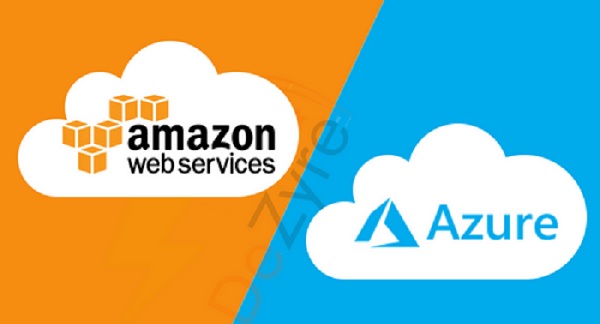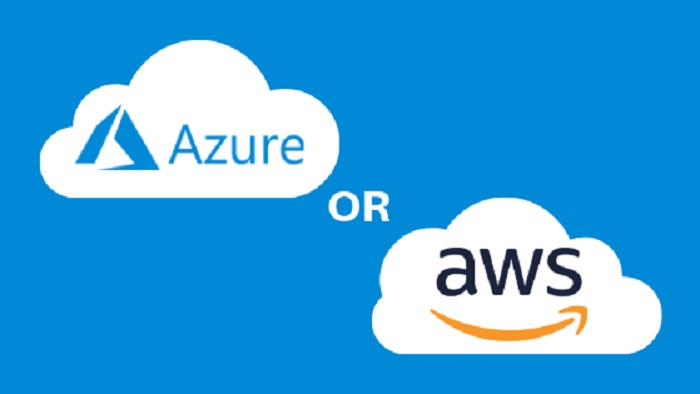Table of Contents
- Cloud Security Standards: Examining the Differences Between AWS and Azure
- Securing Your Cloud Infrastructure: Comparing AWS and Azure’s Security Solutions
- Data Protection in the Cloud: Comparing AWS and Azure Security Solutions
- Cost vs Security: Examining the Costs of Cloud Security on Azure and AWS
Cloud security is an important consideration for any company considering migrating to a cloud platform. Two of the most popular cloud platforms are Microsoft Azure and Amazon Web Services (AWS). Both offer robust security features, but which one is more secure? In this article, we will compare the security features of Azure and AWS to determine which one is more secure. We will look at authentication, access control, encryption, data integrity, and data isolation. This comparison will help you make an informed decision when choosing your cloud security solution.
Assessing the Security Benefits of Cloud Service Providers: A Comparative Analysis of AWS and Azure
The cloud has become a fundamental part of modern IT infrastructure, providing organizations with the scalability, flexibility, and agility that are essential for successful operations. As a result, the security of cloud services is of paramount importance. This paper will provide an overview of the security benefits provided by two of the leading cloud service providers: Amazon Web Services (AWS) and Microsoft Azure. AWS provides a wide range of security features, including data encryption and access control, to help organizations protect their data and applications. The service also supports identity and access management (IAM) to enable customers to create and manage multiple user identities, as well as to control access to resources.
In addition, AWS offers compliance programs such as the AWS Security Compliance Program, which provides customers with an assessment of their security posture and helps them meet industry standards and regulations. Microsoft Azure also offers a comprehensive range of security features, including data encryption and access control, identity and access management, and compliance programs. The Azure Security Center enables customers to monitor their security posture and provides a centralized hub for managing access to resources.
Furthermore, Azure provides a range of services such as advanced threat detection, anomaly detection, and incident response, to enable customers to detect and respond to threats quickly. In conclusion, both AWS and Azure offer a range of security benefits that enable organizations to protect their data and applications. While both services provide similar features, each offers a unique set of benefits that may be better suited to particular organizations. Organizations should consider their individual requirements when selecting a cloud service provider to ensure they receive the security benefits they need.
Cloud Security Standards: Examining the Differences Between AWS and Azure
As cloud computing becomes ever more popular, organizations are increasingly looking to cloud providers to provide secure, reliable, and cost-effective solutions. Of the two leading cloud providers, Amazon Web Services (AWS) and Microsoft Azure, each offers a range of security standards and certifications to meet the specific needs of their customers. In this article, we’ll examine the differences between the security standards and certifications of AWS and Azure, to help organizations make an informed decision about which provider is best suited to their needs. AWS has a number of security certifications and standards, including the Payment Card Industry Data Security Standard (PCI DSS), ISO 27001, and CSA STAR certifications.
AWS also offers its own Security and Compliance Center, where customers can find and review compliance reports, best practices, and other resources for protecting their cloud infrastructure. Additionally, AWS provides customers with a range of features and services to help them secure their cloud infrastructure, such as identity and access management (IAM), encryption services, and virtual private clouds (VPCs). Microsoft Azure also offers a range of security standards and certifications, including PCI DSS, ISO 27001, and CSA STAR.
Additionally, Azure provides customers with its own portal for security-related resources, the Azure Security Center, which helps users identify threats and vulnerabilities, and provides proactive recommendations for mitigating them. Azure also offers a range of services and features to help customers secure their cloud infrastructure, such as Azure Security Center, Azure Key Vault, and Azure Active Directory.
Securing Your Cloud Infrastructure: Comparing AWS and Azure’s Security Solutions
As cloud computing continues to become more prevalent in the enterprise, organizations must ensure that their cloud infrastructure is secure and compliant. Two of the leading providers of cloud solutions are Amazon Web Services (AWS) and Microsoft Azure. Both providers offer comprehensive security solutions with a wide range of features. This article will compare and contrast the security solutions offered by AWS and Azure, helping organizations determine which provider best meets their needs. AWS offers a variety of security solutions, including identity and access management (IAM), encryption, data protection, and threat protection.
IAM enables organizations to control user access to their cloud resources, while encryption ensures that data in transit and at rest is protected from unauthorized access. Data protection solutions such as AWS Config and AWS CloudTrail enable organizations to monitor and audit their cloud resources for security compliance. Finally, AWS provides a range of threat protection solutions such as Amazon GuardDuty and Amazon Inspector, which help organizations detect and respond to security threats. Microsoft Azure offers similar security solutions. Azure Active Directory (Azure AD) allows organizations to control user access to their cloud resources, while Azure Key Vault provides an encrypted storage solution for sensitive information.
Azure provides a range of data protection solutions such as Azure Security Center, which provides customers with visibility into their cloud infrastructure, and Azure Monitor, which enables organizations to detect and respond to security threats. Additionally, Azure offers a range of threat detection and response solutions, such as Azure Advanced Threat Protection and Azure Firewall. Both AWS and Azure provide comprehensive security solutions that enable organizations to protect their cloud infrastructure. However, there are some key differences between the two providers.
AWS provides a more comprehensive range of security solutions, including a wider range of threat detection and response solutions. Additionally, AWS offers more granular control over IAM, allowing organizations to customize user access to their cloud resources. On the other hand, Azure offers a more comprehensive range of data protection solutions, providing organizations with greater visibility into their cloud infrastructure. Ultimately, organizations must decide which provider best meets their security needs. AWS and Azure both offer comprehensive security solutions, but each provider has strengths and weaknesses. Organizations should carefully weigh the pros and cons of each provider before making a decision.
Data Protection in the Cloud: Comparing AWS and Azure Security Solutions
The cloud revolution is transforming the way businesses operate. The cloud offers many advantages, including scalability and cost savings, but it also presents unique security challenges. Data security is paramount in the cloud, and cloud providers must demonstrate that they are taking the necessary steps to protect their customers’ data. In this article, we will compare the security solutions offered by two of the leading cloud providers: Amazon Web Services (AWS) and Microsoft Azure. AWS offers a comprehensive suite of security solutions designed to protect customers’ data.

These solutions include Identity and Access Management (IAM) and Multi-Factor Authentication (MFA), which help control user access to resources. AWS also provides robust network security measures, such as VPCs, firewalls, and encryption. Additionally, AWS provides a variety of monitoring and auditing tools to help customers track changes to their resources and detect suspicious activity. Microsoft Azure also offers a comprehensive set of security solutions. Azure offers similar identity and access management tools as AWS, as well as network security measures such as firewalls and IPsec encryption.
Azure also provides advanced threat detection capabilities, including the Azure Security Center, which helps customers identify and remediate threats quickly. In addition, Azure provides a wide range of monitoring and auditing tools to track changes and detect suspicious activity. Both AWS and Azure offer customers a variety of security solutions to help protect their data. However, the two providers have different approaches when it comes to data protection. AWS offers customers a more hands-on approach, with a wide range of tools and services that customers can use to customize their security posture.
Azure takes a more automated approach, with fewer tools but more comprehensive coverage. Ultimately, the choice between AWS and Azure depends on the customer’s specific security needs. For customers who require a more hands-on approach, AWS may be the best choice. For customers who prefer an automated approach, Azure may be the better option. Both providers offer comprehensive security solutions, and it is up to the customer to decide which one best meets their needs.
Cost vs Security: Examining the Costs of Cloud Security on Azure and AWS
The cloud computing industry is growing rapidly, and there is no shortage of providers offering services to businesses, organizations, and individuals. With the ever-increasing number of cloud solutions available, it is important to understand the costs associated with cloud security in order to make an informed decision when selecting a provider. This article will examine the cost of cloud security on two of the most popular cloud providers: Microsoft Azure and Amazon Web Services (AWS). Microsoft Azure is a comprehensive cloud platform that offers a range of services and features. Azure is built on a trusted infrastructure that is designed to protect customer data.
Azure provides security services such as identity and access management, data encryption, security monitoring, and vulnerability scanning. Azure also offers additional layers of security such as network security, application security, and data protection. The cost of these security services varies depending on the type of service and the number of users, but generally speaking, the cost of Azure security ranges from $3 to $12 per user per month. AWS is another popular cloud provider that offers a range of services and features. AWS provides a range of security services, including identity and access management, data encryption, vulnerability scanning, and security monitoring.
AWS also offers additional layers of security such as network security, application security, and data protection. The cost of these security services varies depending on the type of service and the number of users, but generally speaking, the cost of AWS security ranges from $2 to $15 per user per month. In conclusion, when selecting a cloud provider, it is important to understand the associated costs of cloud security. Microsoft Azure and Amazon Web Services both offer comprehensive security services, but the cost of these services can vary depending on the type of service and the number of users. It is important to do research and compare the costs of each provider in order to make an informed decision.
Final Thought!
Ultimately, determining which cloud platform is more secure comes down to the specific security requirements of the organization. Both Azure and AWS offer a range of security features, and each platform has strengths and weaknesses. It is important for organizations to carefully weigh their security requirements and evaluate the offerings from both cloud providers to determine which one best meets their needs.
